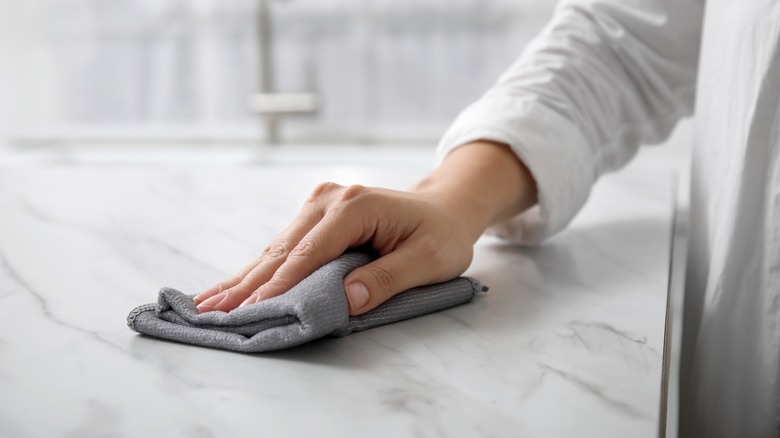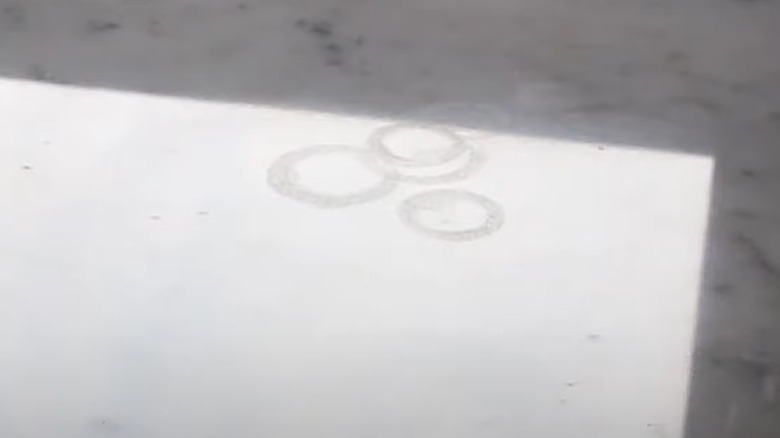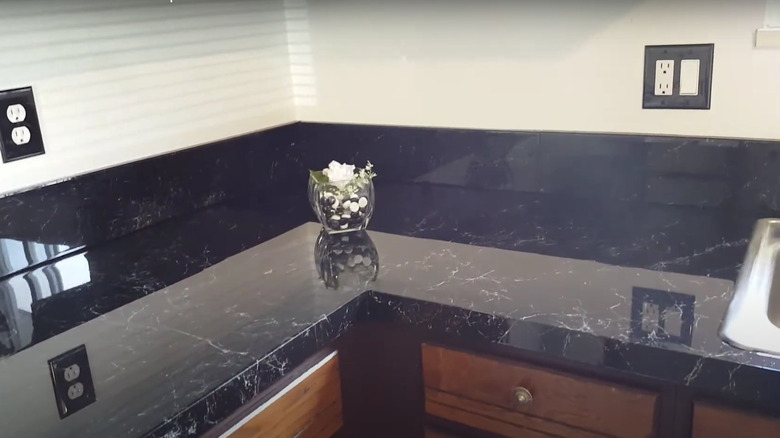The Hidden Downside That May Make You Rethink Marble Countertops
Marble countertops can make a stunning addition to any home, but they may not be the right fit for every kitchen, as they can come with some rather pesky downsides that can leave much to be desired. Speaking to Southern Living, interior designer Laura Hodges explains why this is so: "You're going to spill something on it and you're going to leave a glass out for too long, or something's gonna happen. Then, you're probably going to get a little bit about etching." Clearly, marble is no good if you're looking for a scratch-resistant material, but what does "etching" actually mean?
Well, it means you'll end up with undesirable marks left on your kitchen sides, which, if you're spending a lot of money, is likely something that you won't want to deal with — no matter what their shape or size. Likewise, if you have a messy family, the chances of this effect happening may increase even more and may make you want to rethink installing a countertop made of this particular material.
What causes etching on marble?
One of the biggest contributors towards etching is acids, which comes in forms such as cleaners or other liquids. Speaking to Architectural Digest, director of operations for NYC Marble Care Welberson DosSantos explains: "Acids react with the calcium carbonate and eat away at the stone. Wine, orange juice, and coffee can all etch the stone. Stay away from abrasive products or citrus-based cleaners, like Lysol All-Purpose cleaner, because the acids strip the sealer, and over time you will start to see spotting." If you're careful and manage to avoid spilling or using any of these products on your marble, then you may find it easier to avoid any dreaded etching, particularly if you incorporate items such as placemats for drinks and cups.
However, there may naturally be some instances where it's unavoidable, even if you take good care of your marble, especially if you have guests or young, messy children milling around the area with drinks. Unless you fancy patrolling your kitchen like a hawk every minute of the day, these potential etch-triggering scenarios may be challenging to manage around the clock as it'll be virtually impossible to stay glued in the same spot. If you opt for a countertop using this material, your best bet is to get into good habits and familiarize yourself with what products to use and what to avoid, making it easier to prevent wear and tear and help you care for marble to avoid damage.
Etching is more obvious on darker marbles
If you still want to opt for a marble countertop but are worrying about etching, then there are ways that you can minimize the chances of it being very visible, such as opting for a lighter shade of marble rather than something darker, which should help to dampen the visual effect of it. For example, white would be a better choice than grey or black in this case (unless you have your heart set on a kitchen with a dark interior). Although it's not a magical fix, it essentially puts a band-aid over the problem so that you can lessen any impact while still enjoying the aesthetic of an interior choice that you like in your home.
However, even if you take every precaution possible, the wearing of the material over time is a natural process, and in the long term, you may notice it more and more. For something that is less high-maintenance, then you could always try granite, which, generally speaking, is much easier to care for in comparison to marble, and you won't have to worry about any etching issues either. On the other hand, if your heart is set, try installing your own faux marble DIY countertops, which can help to give a similar illusion to the real deal itself, while easing your concernsat the same time.


